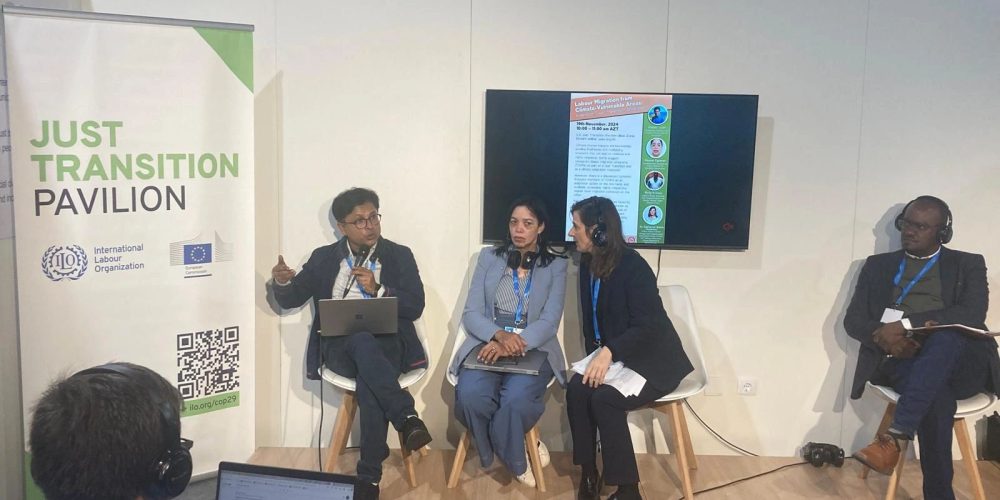At COP29’s Just Transition Pavilion in Baku, Azerbaijan, on 19 November 2024, OKUP unveiled its new publication, Testimonies of Climate Migrants and Families in the Sundarbans Regions of Bangladesh: A Cycle of Debt Traps, Distress, and Exploitation. The publication was showcased during the panel discussion “Labour Migration from Climate-Vulnerable Areas: Adaptation? Just Transition? Exploitation?” Hosted by the International Labour Organization (ILO) in collaboration with the European Commission and co-organized by CMDP and ACT Alliance.
Shakirul Islam, Chairperson of OKUP, shared a testimony from the publication, offering a illustration of how climate change, debt, and migration are interconnected. He introduced the story of a woman from Bangladesh’s Sundarbans region who, driven by escalating debts from repeated climate disasters—such as droughts, floods, and rising soil salinity—was forced to migrate to Saudi Arabia in 2013. Despite paying a broker $1,600 to secure a caregiving job, she was exploited as a domestic worker, enduring physical and emotional abuse in a foreign country. After escaping her employer’s abuse, she returned home only to be rejected by her husband and shunned by her community. Now, living separated from her family, she struggles to survive as a day laborer.
“This story is just one of many that highlight the brutal realities of climate-induced migration,” Shakirul explained. “Women, in particular, are vulnerable to abuse, exploitation, and rejection. These testimonies expose the urgent need for safer migration pathways and stronger protections for migrants.”
The publication paints a grim picture of the living conditions in the Sundarbans, where 93% of households reported their homes being destroyed by cyclones, and 76% faced severe livelihood disruptions due to soil salinity and erratic rainfall. Women and girls in these communities are disproportionately impacted, with many facing early marriage, early pregnancy, and gender-based violence.
OKUP’s participation in COP29 underscored the need for policy coherence to address climate change, migration, and human rights. Shakirul called for mid- and long-term support for rebuilding lives, safe migration pathways, labor protections, and comprehensive social protection systems.
“Migration can be an important adaptation tool, but it must be safer, dignified, and just for those who are forced to migrate,” Shakirul emphasized. “We need policies that connect climate change, migration, and human rights to ensure migrants are not left vulnerable to exploitation.”
Through this publication and its advocacy at COP29, OKUP continues to amplify the voices of climate migrants, urging global leaders to take action that prioritizes human dignity and justice in climate adaptation strategies.


